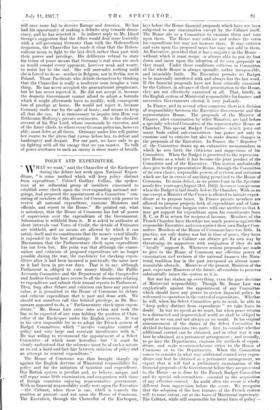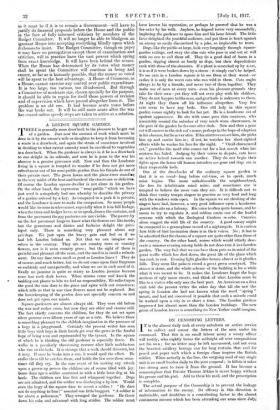POLICY AND EXPENDITURE.
" WHAT we want," said the Chancellor of the Exchequer during the debate last week upon National Expen- diture, " is some method which will keep policy distinct from expenditure." Colons' Godfrey Collins, the spokes- man of an influential group of members concerned to establish some check upon the ever-expanding national out- goings, had proposed the appointment of a Committee " con- sisting of members of this House (of .Commons) with power to review all national expenditure, examine Ministers and • officials, and report to the House." He pointed out, what is notorious, that the House of Commons has lost all power of supervision over the expenditure of the Government. Information is withheld from it. It is asked to authorize at short intervals vast Votes of Credit, the details of Estimates are withheld, and no means are allowed by which it can satisfy itself and its constituents that the money voted blindly is expended to the best advantage. It was argued by Dr. Macnamara that the Parliamentary check upon expenditure has not been lost. His point was that although the exami- nation and criticism of proposed expenditure are no longer possible during the war, the machinery for checking expen- diture after it had been incurred is practically the same now as it had been in pre-war days. That is to say, although Parliament is obliged to vote money blindly, the Public Accounts Committee and the Department of the Comptroller and Auditor-General have access to all the documents relating to expenditure and submit their annual reports to Parliament. Then, long after debate and criticism can have any practical value, it is permitted to the House of Commons to debate and criticize expenditure that is past and done with. We should not ourselves call this belated privilege, as Dr. Mac- namara appeared to do, a " Parliamentary check upon expen- diture." Mr. Bonar Law came into action and took the line to be expected of any man holding the position of Chan- cellor of the Exchequer under the English system. It was in his view impossible for us to adopt the French system of Budget Committees, which " involve complete control of policy and very large and constant interference with it." He was willing to recommend the appointment of a Select Committee—of which more hereafter—but " it must be clearly understood that the reference must be of such a nature as to cut a hard-and-fast line between criticism of policy and an attempt to control expenditure."
The House of Commons was thus brought sharply up against the English doctrine of Ministerial responsibility for policy and for the initiation of taxation and expenditure. Our British system is peculiar and, we believe, unique, and will repay some little examination and comparison with those of foreign countries enjoying representative government. With us financial responsibility really rests upon the Executive -.—the Cabinet, when there is one, which is scarcely the position at present—and not upon the House of Commons. The Executive, through the Chancellor of the Exchequer,
lays before the House financial proposals which have not been subjected to any examination except by the Cabinet itself. The House sits as a Committee to examine them and vote upon them. The House may criticize and reduce the votes for expenditure but may not increase them. It may- criticize and vote upon the proposed taxes but may not add to them. An Executive, provided that it has a majority in the House— without which it must resign—is always able to put its foot down and insist upon the adoption of its own proposals as they stand. Under these conditions criticism in Committee of the whole House is always sporadic, rather irresponsible, and invariably futile. No Executive permits its Budget to be materially interfered with and always has the last word. If the financial proposals have not been critically examined by the Cabinet, in advance of their presentation to the House, they are not effectively examined at all. That, briefly, is the English system of Ministerial responsibility for finance, and successive Governments cherish 'it very jealously.
In France, and in several other countries, there is a division of responsibility between the Executive Government and the representative House. The proposals of the Minister of Finance, after examination by other Ministers, are laid before a specially selected Committee of the representative House or Chamber. This special Budget Committee—which puts out many buds called sub-committees—has power not only to examine and to criticize but also to make drastic changes in the proposals of the Executive. In France the " Reporter " of the Committee draws up an exhaustive memorandum in which he sets forth the criticisms and suggestions of his Committee. When the Budget is presented to the representa- tive House as a whole it has become the joint product of the Committee and of the Executive. This system undoubtedly does give to the representative House, through the Committee of its own choice, responsible powers of revision and initiation which are far in excess of anything permitted to the House of Commons. Its main defect, as we pointed out in the Spectator nearly five years ago (August 31st, 1912), becomes conspicuous when the Budget is laid finally before. the Chamber. With us no one except a Minister of the Crown is allowed to initiate expen- diture or to propose taxes. In Fiance private members are allowed to propose projects both of expenditure and of taxa- tion ; members may bargain votes with one another so that A may get support for expenditure upon his constituents from B, C, or D in return for reciprocal favours. Members of the French Chamber have therefore too much power as against the responsible Executive. and even against their own Budget Com- mittee. Members of the House of Commons have too little. In practice, not only during war but in time of peace, they have none at all. For a Cabinet can always get its own way by threatening its supporters with resignation if they do not " loyally " support it. Whenever serious proposals are made to give to the House of Commons any effective power of examination and revision of the national finances the Minis- terial, tradition has in the past interposed an almost insur- mountable obstacle. Ministers of the present, Ministers of the past, expectant Ministers of the future, all combine to preserve substantially intact the system as it is.
But war has shaken up everything, even the pure doctrine • of Ministerial responsibility. Though Mr. Boner Law was emphatically against the appointment of any Committee which should have any power to review financial policy, he welcomed co-operation in the control of expenditure. Whether he will, when his Select Committee gets to work, be able to " keep policy distinct from expenditure " we take leave to doubt. In war we spend as we must, but when peace returns to a distracted and impoverished world we shall be obliged to spend as we can and not always as we would. In his original announcement of the duties of the Select Committee he divided its functions into two parts—first, to consider whether additional control can be obtained, and in what way it cam best be obtained, as a permanent arrangement ; and secondly, to go into the Departments, examine the methods of expen- diture, and make recommendations either to the House of Commons or to the Departments. When the Committee conies to consider in what way additional control over expen- diture can best be obtained as a permanent arrangement, we expect that it will find a preliminary examination of the financial proposals of the Government before they are presented to the House—as is done by the French Budget Committee and its special sub-committees--essential to the acquisition of any effective control. An audit after the event is wholly different from supervision before the event. We recognize that the adoption of the best features of the French system will, to some extent, cut at the bases of Ministerial supremacy. The Cabinet, while still responsible for broad lines of policy- as it must be if it is to remain a Government—will have to justify its financial proposals before the House and the public in the face of fully informed criticism by members of the Budget Committee. It will no longer be able to bludgeon an ignorant House into accepting everything blindly upon which it chooses to insist. The Budget Committee, though on paper it may have no prerogatives except those of examination and criticism, will in practice have the vast powers which spring from exact knowledge. It will have been behind the scenes. When the House has determined by its votes what money shall be spent the Committee will continue in being and ensure, so far as is humanly possible, that the money so voted will be spent to the best advantage. A House of Commons, as a House, cannot exercise any control over public expenditure. It is too large, too various, too ill-informed. But through a Committee of moderate size, chosen specially for the purpose, it should be able to regain for itself those powers of revision and of supervision which have passed altogether from it. The problem is an old one. It had become acute years before the war broke out. It will be still more acute after the war has ceased unless speedy steps are taken to arrive at a solution.



























 Previous page
Previous page